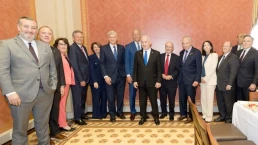Anderson Cooper’s recent feigned indignation at the idea that the U.S. commits war crimes shows the primary ideological function of the U.S. media.
by Adam Johnson, Discourse Blog
As I’ve written here and elsewhere, affirming and reinforcing the premise that the US and its allies must exist in a sacred moral category separate from other major global powers is a key function of the US media. Our media can criticize here and there around the margins, but it must ultimately prop up the civic religion and its essential dogma that the US has noble and humanitarian intentions, whatever this means. A good example of this essential role happened a few days ago on CNN, when Green Party presidential candidate Cornel West was on CNN’s Anderson Cooper 360 discussing Russia and US war crimes.
Without commenting on the other claims West made in the interview (or the wisdom of his campaign), his claim that, in recent memory, the US has committed war crimes comparable to those committed by Russia during the Battle of Grozny is profoundly uncontroversial and self-evident. But Cooper wouldn’t hear any of it, insisting that “it’s inappropriate to compare the Russian bombing of Grozny, and what we witnessed there, to the War in Iraq…I don’t think it’s accurate to compare the pummeling of a city with Russian artillery with civilians inside, with the intention of destroying and flattening a city with actions the US took [in Iraq]”

Intent here is a rather squishy concept and one that, in this context, is transparently self-serving and impossible to falsify.
After Current Affairs’ Nate Robinson pointed this out he was subject to a similar feigned outrage by defenders of America’s civic religion, chief among them University of Illinois professor Nicholas Grossman, putative liberal whose previous entry into this debate was a robust defense of the US War on Terror in The Atlantic titled, “America’s Forever War Must Go On.”
Recent Posts
What To Do When You See ICE In Your Neighborhood
July 14, 2025
Take Action Now How can you deter the Trump administration’s immigrant deportation machine when it pops up in your community? Follow these…
ICE Campaign Of Violence Will Lead To More Deaths
July 14, 2025
Take Action Now Jaime Alanis’s death shows the horrific consequences of a secret police force behaving with utter impunity.By Natasha Lennard, The…
Hague Group: “Concrete Measures” or Sack of Cement? Will It Move to Sanctions, Peace Force and Ensuring Aid to Gaza?
July 13, 2025
Take Action Now Will the meeting in Colombia be a coalescence of global opinion driving states to just action — or just more rhetoric from various…
Why Are Democratic Lawmakers Still Meeting With Netanyahu?
July 12, 2025
Take Action Now Pictures show Democrats like Chuck Schumer standing next to Netanyahu, smiling.By Sharon Zhang, Truthout A bipartisan group of…




